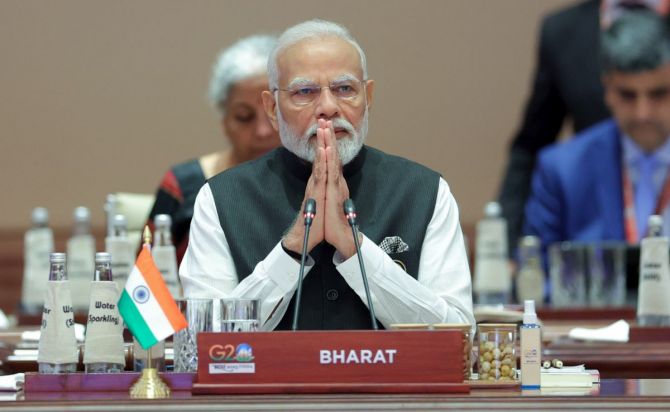One looks upon the coming new year with foreboding as current wars in Ukraine and Gaza spill over and escalate and new ones erupt in incipient fault lines across the world, notes former foreign secretary Shyam Saran.

As we head towards the end of 2023, the dominant sentiment across countries and peoples is a lack of agency and a sense of losing control.
This is paradoxical since most governments swear that they are taking back control over the destinies of their countries.
Their citizens have given the reins to cynical leaders who peddle narrow nationalism and parochialism.
These attitudes have trumped any prospect of even minimal international collaboration to tackle global challenges such as climate change, whose salience increases relentlessly.
Vaccine nationalism seen during the COVID-19 pandemic was a spectacular demonstration of self-defeating myopia and a pervasive lack of empathy for the pain and suffering of fellow human beings.
Our sensibilities have become benumbed. The daily and despicable horrors being visited upon the hapless people of Gaza and the West Bank have failed to trouble our collective conscience.
One looks upon the coming new year with foreboding as current wars in Ukraine and Gaza spill over and escalate and new ones erupt in incipient fault lines across the world.
This embrace of unrestrained violence is matched by new instruments of war wonders of technological advancement whose frenetic pace is leaving us both bedazzled and bewildered.
In March this year, OpenAI released GPT-4 to the public.
This has begun to erase the dividing line between what is real and flesh and blood, and what is virtual and infinitely malleable.
How will our analogic minds wrap around this digital reality?
This may prove to be the most consequential development in 2023 that may irreversibly transform our lives in 2024 and beyond.
It will impact geopolitics. As one analyst points out: Although technology has often influenced geopolitics, the prospect for AI (artificial intelligence) means that the technology itself could become a geopolitical actor.
AI poses the most global of challenges, flowing effortlessly across borders.
However, its controls rest in the hands of just a few powerful operators and not all of them are governments.
The technology has developed in the hands of a handful of multinational tech companies.
Governments have neither the knowledge nor the capability to regulate them.
Even for regulation, they must rely on these very same entities.
Countries like China have all along maintained a tight control over any technological development that may endanger regime security.
China may be better placed to regulate AI, but then there is the ominous prospect of it being harnessed to subserve the overweening ambitions of the Communist party of China.
Such a prospect could well trigger a competitive and dangerous geopolitical scramble whose denouement could be catastrophic.
It is a paradox of our times that just when most of our challenges and threats to our well-being have become global, our attitudes have become more narrowly national.
There is no alternative to truly global and collaborative responses delivered through empowered international institutions of governance and working through multilateral processes whose guiding principle is equity.
The most powerful instruments of violence are available to State and non-State actors.
The Hamas attack against Israel is testimony to the power of the weak and dispossessed to inflict terrible, even if fleeting, harm.
2023 proved that the war on terror is far from over.
Its asymmetric potential has been enhanced by the same technological advancement that states are pursuing.
All countries that have disaffected constituencies must understand that there can never be an assurance that incipient mutinies have been laid to rest.
They may re-ignite unexpectedly and wreak terrible damage and engulf a state and its people in a spiral of escalating violence.
Violence should not be legitimised as a political instrument.
There is no cause, however noble, which justifies the killing of innocent men, women and children.
Once unleashed, violence will always spread beyond its intended targets.
Violence brutalises the perpetrators as much as its victims. We see this in Israel.
Mahatma Gandhi understood this truth. His concept of ahimsa or non-violence was anchored in this profound awareness.
The more we deviate from this legacy, the greater the likelihood that the multiple fault lines, which may polarise our own plural society, could threaten the survival of the Indian state.
Or their suppression may only be possible, and only temporarily, with the abandonment of democracy.

However, 2023 had a positive development on one global and existential issue, that of climate change.
At the 28th Conference of the Parties (COP28) to the UN Framework Convention on Climate Change, there were some hopeful decisions which could, if implemented, lead to a reorientation of the global economy towards an ecologically sustainable future.
The acknowledgement, for the first time, that in order to deal with climate change, the world needs to transition away from its current reliance on fossil fuels towards a pattern of growth based progressively on renewable and cleaner sources of energy is significant.
This is an opportunity to harness the powerful new technologies, including AI, to deliver on this objective within a shrinking timeframe and on an unprecedented scale.
But the response has to be both global and collaborative and based on equity.
The promise of 2023, including on climate change, must begin to be delivered upon in 2024 but there will be greater uncertainty and unpredictability.
The US will have presidential elections with a real possibility that Donald Trump will be elected, bringing renewed nativism to a country whose leadership and capabilities are indispensable to meeting global challenges.
The continuing and brutal Israel-Hamas conflict and the inevitable escalation of the Ukraine War will further polarise geopolitics.
Vladimir Putin has sensed American distraction and the flagging Western support for Ukraine.
He will up the ante and hope that a Trump presidency will help deliver a coup de grace on Ukraine.
A US stretched to the limit, tackling two wars and a rising threat in the Indo-Pacific, may feel compelled to dampen down its competitive rivalry with China.
Signs of this are already apparent.
Joe Biden having decided not to visit India as a guest on Republic Day in January and the postponement of the Quad summit scheduled around that time, may well be a pointer to an altered American strategy.
This may also be linked to the fallout from the Pannun affair and the alleged attempted assassination charges being investigated by Indian authorities.
The high achieved with the successful G20 summit hosted by India in September has faded, though our own elections in the new year may award a third term to Prime Minister Narendra Modi and India may be exceptional in enjoying political stability among major countries.
This will be an asset in the more complex diplomacy required in 2024.
We may well end up being nostalgic about 2023 as the new year unfolds.
Ambassador Shyam Saran is a former foreign secretary and an honorary fellow at the Centre for Policy Research.
Feature Presentation: Aslam Hunani/Rediff.com












 © 2025
© 2025